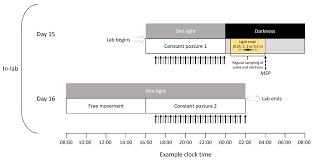Circadian Rhythm Optimization: The Key to Better Sleep and Productivity
Have you ever wondered why some people seem to have boundless energy and focus, while others struggle to make it through the day without feeling exhausted? The answer may lie in their circadian rhythm.
The circadian rhythm is our body’s internal clock that regulates our sleep-wake cycle, hormone production, and other physiological processes. It’s controlled by a group of nerve cells in the brain called the suprachiasmatic nucleus (SCN), which receives input from light-sensitive cells in the eyes.
When our circadian rhythm is disrupted, it can lead to a variety of health problems, including insomnia, depression, obesity, and diabetes. But by optimizing our circadian rhythm, we can improve our sleep quality, energy levels, and productivity.
Here are some tips for optimizing your circadian rhythm:
- Get plenty of bright light during the day: Exposure to bright light during the day helps regulate your circadian rhythm and improve your mood and alertness. Try to spend at least 30 minutes outside each day or use a light therapy lamp if you work indoors.
- Avoid bright light at night: Exposure to bright light at night can disrupt your circadian rhythm and make it harder to fall asleep. Avoid using electronic devices with blue light (such as smartphones or tablets) for at least an hour before bedtime.
- Keep a consistent sleep schedule: Going to bed and waking up at the same time every day helps regulate your circadian rhythm and improve your sleep quality.
- Avoid caffeine and alcohol late in the day: Caffeine can interfere with sleep by blocking adenosine receptors in the brain, while alcohol can disrupt REM sleep. Try to avoid consuming either of these substances within six hours of bedtime.
- Create a relaxing bedtime routine: Engage in relaxing activities like reading or taking a warm bath before bed to help signal to your body that it’s time to sleep.
By optimizing your circadian rhythm, you can improve your sleep quality and overall health. So why not give it a try? Your body (and mind) will thank you.
Answers to Your Top 4 Questions on Optimizing Circadian Rhythm
- How many days does it take to fix circadian rhythm?
- What is optimal circadian rhythm?
- How do I optimize my circadian rhythm?
- What are the 4 circadian rhythms?
How many days does it take to fix circadian rhythm?
The time it takes to fix a disrupted circadian rhythm can vary depending on the individual and the severity of the disruption. In general, it can take anywhere from a few days to a few weeks to reset your circadian rhythm.
If you have jet lag or have been staying up late for several nights in a row, it may only take a few days to get back on track. However, if you have been working night shifts for an extended period of time or have a chronic sleep disorder, it may take longer to reset your circadian rhythm.
The key is to be consistent with your sleep schedule and stick to healthy sleep habits. This includes going to bed and waking up at the same time every day, avoiding bright light before bedtime, creating a relaxing bedtime routine, and avoiding caffeine and alcohol late in the day.
It’s important to note that fixing your circadian rhythm is not an overnight process and requires patience and persistence. But with time and effort, you can improve your sleep quality and overall health by optimizing your circadian rhythm.
What is optimal circadian rhythm?
Optimal circadian rhythm refers to a healthy, well-functioning internal clock that regulates our sleep-wake cycle, hormone production, and other physiological processes. It’s characterized by regular sleep patterns, high energy levels during the day, and restful sleep at night.
An optimal circadian rhythm is essential for good health and productivity. When our internal clock is disrupted, it can lead to a variety of health problems, including insomnia, depression, obesity, and diabetes.
By following healthy habits such as getting plenty of bright light during the day, avoiding bright light at night, keeping a consistent sleep schedule, avoiding caffeine and alcohol late in the day, and creating a relaxing bedtime routine can help optimize your circadian rhythm.
Optimizing your circadian rhythm can lead to better sleep quality and overall health. It can also improve your mood and alertness during the day which can enhance your productivity.
How do I optimize my circadian rhythm?
Optimizing your circadian rhythm involves making changes to your daily routine and habits to promote better sleep and overall health. Here are some tips for optimizing your circadian rhythm:
- Get plenty of bright light during the day: Exposure to bright light during the day helps regulate your circadian rhythm and improve your mood and alertness. Try to spend at least 30 minutes outside each day or use a light therapy lamp if you work indoors.
- Avoid bright light at night: Exposure to bright light at night can disrupt your circadian rhythm and make it harder to fall asleep. Avoid using electronic devices with blue light (such as smartphones or tablets) for at least an hour before bedtime.
- Keep a consistent sleep schedule: Going to bed and waking up at the same time every day helps regulate your circadian rhythm and improve your sleep quality.
- Avoid caffeine and alcohol late in the day: Caffeine can interfere with sleep by blocking adenosine receptors in the brain, while alcohol can disrupt REM sleep. Try to avoid consuming either of these substances within six hours of bedtime.
- Create a relaxing bedtime routine: Engage in relaxing activities like reading or taking a warm bath before bed to help signal to your body that it’s time to sleep.
- Exercise regularly: Exercise is known to improve sleep quality, but it’s important to avoid exercising too close to bedtime as it can stimulate the body and make it harder to fall asleep.
- Eat a healthy diet: A balanced diet rich in whole foods can help regulate hormones that affect our circadian rhythm, such as melatonin.
By incorporating these tips into your daily routine, you can optimize your circadian rhythm and promote better sleep, energy levels, and overall health. Remember that it may take some time for these changes to take effect, so be patient and consistent in your efforts.
What are the 4 circadian rhythms?
There are actually more than four circadian rhythms, but the four most well-known and studied ones are:
- Sleep-wake rhythm: This is the most well-known circadian rhythm, which regulates our sleep and wake cycles. It’s controlled by the SCN in the brain, which responds to light and dark cues to signal when it’s time to sleep or wake up.
- Body temperature rhythm: Our body temperature follows a 24-hour cycle, with the lowest point occurring during sleep and the highest point occurring in the late afternoon or early evening. This rhythm is also controlled by the SCN.
- Hormone secretion rhythm: Many hormones, including cortisol (the stress hormone), melatonin (the sleep hormone), and growth hormone, follow a 24-hour cycle. Disruptions to this rhythm can lead to health problems such as insomnia, depression, and obesity.
- Feeding/fasting rhythm: Our bodies have an internal clock that regulates our appetite and metabolism based on when we eat and fast. Disruptions to this rhythm can lead to overeating, weight gain, and other health problems.
These circadian rhythms are all interconnected and work together to regulate our overall health and well-being. By understanding them better and optimizing them through healthy habits such as regular sleep patterns, exposure to bright light during the day, avoiding bright light at night, regular exercise, healthy eating habits etc., we can improve our overall health outcomes.




